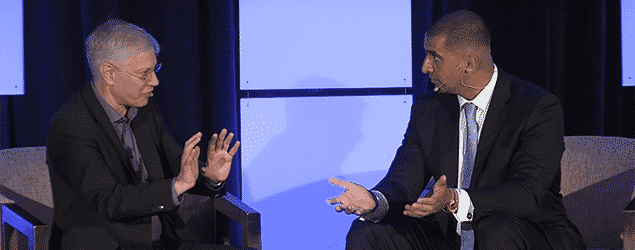Anniversary Chapters: Michael Berliner Discusses “The Atlas Shrugged Reviews”

To celebrate the 60th publication anniversary of Ayn Rand’s Atlas Shrugged, we’re talking to the authors of chapters in Robert Mayhew’s book Essays on Ayn Rand’s “Atlas Shrugged.” Next up is Michael Berliner, whose chapter “The Atlas Shrugged Reviews” surveys the critical response to Rand’s magnum opus, which was published in 1957.
In writing this chapter, Berliner drew on what he had learned in summarizing the reviews of We the Living, Anthem and The Fountainhead in previous Mayhew collections (see here, here and here) to reach a chilling conclusion: “The lesson I learned was that the more explicit the philosophy, the more negative the reviews. And the culmination of that unfortunate trend came with the reviews of Atlas.”
Berliner researched Rand’s own clippings, preserved in the Ayn Rand Archives, of reviews from such publications as the New York Times, the New Yorker, Time and the Atlantic as well as lesser known outlets. “Since most of the reviews of Atlas were negative and non-intellectual, reading them — even my summaries of them — is not an uplifting experience, but they are a cultural barometer,” he said. “And there’s a positive side: You realize how much better the media reaction to Rand is now. It will probably come as a surprise to younger readers how awful it was in the 1950s.”
Berliner taught philosophy and philosophy of education for many years at California State University, Northridge, before becoming the founding executive director of the Ayn Rand Institute in 1985. He is the editor of Letters of Ayn Rand and Understanding Objectivism and has served as cochairman of ARI’s board of directors. He is currently senior adviser to the Ayn Rand Archives.
Asked how writing his chapter enhanced his appreciation of Rand’s abilities, Berliner said: “Two things stand out. One is how objective a person she was. In her biographical interviews, she talked about what she wanted in reviews: not positive gushing, but reviews that named the essentials of her novels and gave reasons, whether pro or con. Second, the reviews of Atlas were really a turning put in her career and showed what a fighter she was. The negativity and low level of the reviews were a major factor in her decision to become a public speaker, taking to college campuses to defend her philosophy. I think this was the start of her becoming a ‘public figure.’”
Here’s a sample from Berliner’s chapter:
The reviews in New York City — which Ayn Rand thought to be the only important reviews for any book — were mostly negative. The New York Times Book Review (October 13 [1957]), selected . . . ex-Communist Party member Granville Hicks as its reviewer. Hicks, in fact, had been an editor at Macmillan in 1936 and, according to Ayn Rand had tried unsuccessfully to prevent Macmillan from publishing We the Living. Hicks called Atlas Shrugged a harangue and not a serious novel. He made fun of having heroes and villains and attacked the novel for being a tribute to the superior individual. The book, he concluded, was written out of hate, a conclusion whose sole basis was that it was set in a dying New York City.
Interestingly, Berliner’s favorite part of his chapter is “the section about the most disgusting review she ever got about any of her writings: the review by Whittaker Chambers in the National Review.” Chambers, he explained, “was an ex-Communist turned religionist. Analyzing his review in some depth, and reading substantial portions of his autobiography, Witness, gave the me the opportunity to reveal that the roots of his hatred of Atlas were in his own philosophy. And personally, it was very satisfying to give Ayn Rand some small bit of justice.”
If you find these perspectives intriguing, Essays on Ayn Rand’s “Atlas Shrugged” is available here, and more on Atlas Shrugged is available here.



